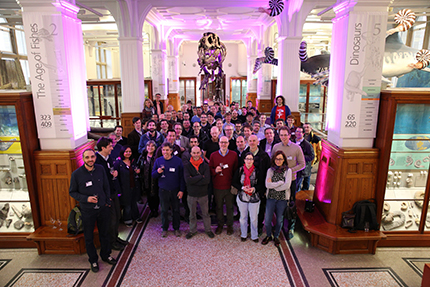80 physicists gathered in Manchester on April 6th and 7th to discuss the future of the LHCb experiment. The LHCb collaboration is currently constructing a significant upgrade to its experiment which will be installed in 2019/2020. The workshop in Manchester, entitled “Theatre of Dreams: Beyond the LHCb Phase I Upgrade”, explored the longer term future of the experiment in the second-half of the coming decade, and thereafter. The image below shows the Workshop participants at the University of Manchester museum.
In the mid-2020s the LHC will be upgraded for higher luminosity operation. At this time the ATLAS and CMS experiments plan to undertake major phase II upgrades of their experiment. These works will necessitate a long-shutdown of at least 2.5 years duration. The meeting discussed enhancements to the LHCb experiment, dubbed a Phase Ib upgrade, that could be installed at this time. Although relatively modest, these improvements could bring significant physics benefits to the experiment. These include an addition to the particle Identification system using an innovative time of flight system based on Cherenkov light; placing detector chambers along the sides of the LHCb dipole to extend the physics reach by reconstructing lower momentum particles; and replacing the inner region of the electromagnetic calorimeter with new technology, thus extending the experiment’s measurement programme with photons, neutral pions and electrons.
In the second half of the 2020s, the LHCb upgraded experiment that is currently under construction will reach the end of its planned programme. At this time a Phase II upgrade of the experiment could be foreseen. The goal would be to collect an integrated luminosity of at least 300 fb-1, with an instantaneous luminosity a factor ten above the upgrade that will operate in the 2020s. Promising high luminosity scenarios for LHCb from the LHC machine perspective were shown which would potentially allow this goal to be reached, and each of the elements of the LHCb experiment presented their first thoughts on how these goals might be achieved. The experimental physics programme, the theory perspectives of heavy flavour physics, and the anticipated reach of Belle II and the other LHC experiments were also considered.
Many promising ideas were presented at the workshop and these will be followed up in the forthcoming months to identify the requirements and the R&D programmes that will be needed to bring these concepts to reality.
The meeting was sponsored by STFC, Institute of Physics and Institute of Particle Physics Phenomenology and the University of Manchester.

